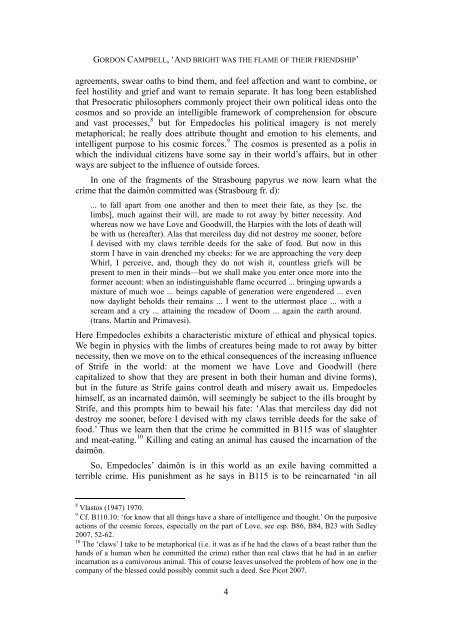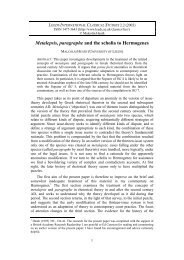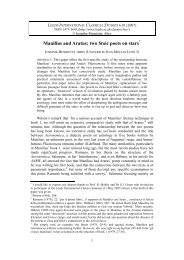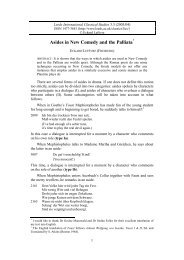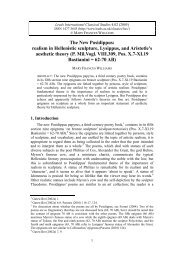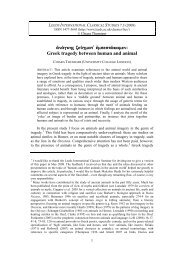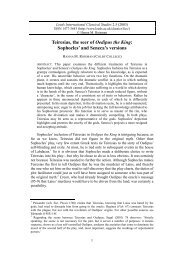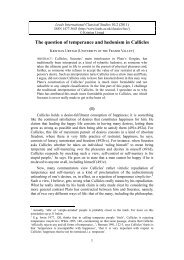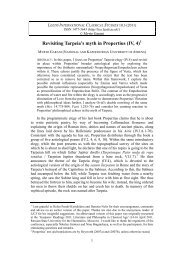'And bright was the flame of their friendship' - Leeds International ...
'And bright was the flame of their friendship' - Leeds International ...
'And bright was the flame of their friendship' - Leeds International ...
You also want an ePaper? Increase the reach of your titles
YUMPU automatically turns print PDFs into web optimized ePapers that Google loves.
GORDON CAMPBELL, ‘AND BRIGHT WAS THE FLAME OF THEIR FRIENDSHIP’<br />
agreements, swear oaths to bind <strong>the</strong>m, and feel affection and want to combine, or<br />
feel hostility and grief and want to remain separate. It has long been established<br />
that Presocratic philosophers commonly project <strong>the</strong>ir own political ideas onto <strong>the</strong><br />
cosmos and so provide an intelligible framework <strong>of</strong> comprehension for obscure<br />
and vast processes, 8 but for Empedocles his political imagery is not merely<br />
metaphorical; he really does attribute thought and emotion to his elements, and<br />
intelligent purpose to his cosmic forces. 9 The cosmos is presented as a polis in<br />
which <strong>the</strong> individual citizens have some say in <strong>the</strong>ir world’s affairs, but in o<strong>the</strong>r<br />
ways are subject to <strong>the</strong> influence <strong>of</strong> outside forces.<br />
In one <strong>of</strong> <strong>the</strong> fragments <strong>of</strong> <strong>the</strong> Strasbourg papyrus we now learn what <strong>the</strong><br />
crime that <strong>the</strong> daimôn committed <strong>was</strong> (Strasbourg fr. d):<br />
... to fall apart from one ano<strong>the</strong>r and <strong>the</strong>n to meet <strong>the</strong>ir fate, as <strong>the</strong>y [sc. <strong>the</strong><br />
limbs], much against <strong>the</strong>ir will, are made to rot away by bitter necessity. And<br />
whereas now we have Love and Goodwill, <strong>the</strong> Harpies with <strong>the</strong> lots <strong>of</strong> death will<br />
be with us (hereafter). Alas that merciless day did not destroy me sooner, before<br />
I devised with my claws terrible deeds for <strong>the</strong> sake <strong>of</strong> food. But now in this<br />
storm I have in vain drenched my cheeks: for we are approaching <strong>the</strong> very deep<br />
Whirl, I perceive, and, though <strong>the</strong>y do not wish it, countless griefs will be<br />
present to men in <strong>the</strong>ir minds—but we shall make you enter once more into <strong>the</strong><br />
former account: when an indistinguishable <strong>flame</strong> occurred ... bringing upwards a<br />
mixture <strong>of</strong> much woe ... beings capable <strong>of</strong> generation were engendered ... even<br />
now daylight beholds <strong>the</strong>ir remains ... I went to <strong>the</strong> uttermost place ... with a<br />
scream and a cry ... attaining <strong>the</strong> meadow <strong>of</strong> Doom ... again <strong>the</strong> earth around.<br />
(trans. Martin and Primavesi).<br />
Here Empedocles exhibits a characteristic mixture <strong>of</strong> ethical and physical topics.<br />
We begin in physics with <strong>the</strong> limbs <strong>of</strong> creatures being made to rot away by bitter<br />
necessity, <strong>the</strong>n we move on to <strong>the</strong> ethical consequences <strong>of</strong> <strong>the</strong> increasing influence<br />
<strong>of</strong> Strife in <strong>the</strong> world: at <strong>the</strong> moment we have Love and Goodwill (here<br />
capitalized to show that <strong>the</strong>y are present in both <strong>the</strong>ir human and divine forms),<br />
but in <strong>the</strong> future as Strife gains control death and misery await us. Empedocles<br />
himself, as an incarnated daimôn, will seemingly be subject to <strong>the</strong> ills brought by<br />
Strife, and this prompts him to bewail his fate: ‘Alas that merciless day did not<br />
destroy me sooner, before I devised with my claws terrible deeds for <strong>the</strong> sake <strong>of</strong><br />
food.’ Thus we learn <strong>the</strong>n that <strong>the</strong> crime he committed in B115 <strong>was</strong> <strong>of</strong> slaughter<br />
and meat-eating. 10 Killing and eating an animal has caused <strong>the</strong> incarnation <strong>of</strong> <strong>the</strong><br />
daimôn.<br />
So, Empedocles’ daimôn is in this world as an exile having committed a<br />
terrible crime. His punishment as he says in B115 is to be reincarnated ‘in all<br />
8 Vlastos (1947) 1970.<br />
9 Cf. B110.10: ‘for know that all things have a share <strong>of</strong> intelligence and thought.’ On <strong>the</strong> purposive<br />
actions <strong>of</strong> <strong>the</strong> cosmic forces, especially on <strong>the</strong> part <strong>of</strong> Love, see esp. B86, B84, B23 with Sedley<br />
2007, 52-62.<br />
10 The ‘claws’ I take to be metaphorical (i.e. it <strong>was</strong> as if he had <strong>the</strong> claws <strong>of</strong> a beast ra<strong>the</strong>r than <strong>the</strong><br />
hands <strong>of</strong> a human when he committed <strong>the</strong> crime) ra<strong>the</strong>r than real claws that he had in an earlier<br />
incarnation as a carnivorous animal. This <strong>of</strong> course leaves unsolved <strong>the</strong> problem <strong>of</strong> how one in <strong>the</strong><br />
company <strong>of</strong> <strong>the</strong> blessed could possibly commit such a deed. See Picot 2007.<br />
4


